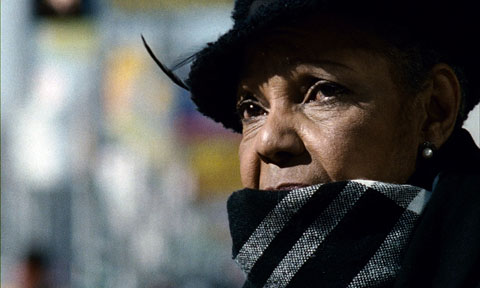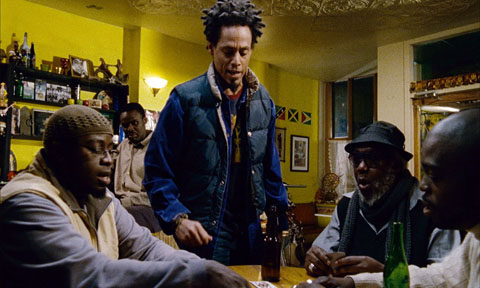Cold comfort
By Georgia Popplewell
A Winter Tale, directed by Frances-Anne Solomon (103 minutes)
Leonie Forbes as Miss G in A Winter Tale. Photograph courtesy Leda Serene Films
Miss G’s restaurant has bright yellow walls and accents of green and red, a warm Caribbean space where people gather against the grey Toronto winter. It’s also a Caribbean archetype, the local bar, the rum shop transplanted to the urban metropolis, along with the eating, the drinking, the card- and domino-playing, and, most importantly, the talk. In A Winter Tale, the deft new film by Trinidadian Frances-Anne Solomon, the restaurant is the hub around which everything revolves, as it morphs from a safe refuge from icy streets, cramped apartments, and shaky relationships into a place where the conscience of black urban Canada is placed under the microscope.
I saw A Winter Tale for the first time in early June, at a theatre in a mental health facility (in Canada, mental health facilities have such things) not far from Parkdale, the Toronto district where the film’s action takes place. Because my visual point of reference for urban decay is the Caribbean ghetto and inner-city USA, I’ll admit I struggled a bit to see even this seedier end of Queen Street as the backdrop to the tragedy the film recounts.
A large part of this tragedy, however, is internal. The murder of a young boy by a stray bullet in the film’s opening minutes lays bare the malaise which allows such things to happen in the first place, and reveals the inability of the film’s characters to face up to their roles in creating and perpetuating it. This includes both women and men, but Solomon, who was inspired to make the film after a spate of black-on-black violence dominated the Toronto headlines some years ago, has said the focus on men — the perpetrators of the violence — is deliberate. Which isn’t to say that the five women who figure in the film — three not entirely understanding partners, and two despairing but collusive archetypal Caribbean mothers (one of them Miss G, whose inability to refrain from infantilising men is beyond pathological) — get off easy.
When Gene, a former track-and-field star turned community activist, fails in his efforts to organise the support group he’s received government funding to convene (again, only in Canada), a cosmic decision is made to formalise the gatherings at Miss G’s into a series of rap sessions, which, naturally, sends certain members of the group running for cover, at the idea of both confronting their feelings and revealing certain aspects of their personal histories. It’s familiar territory, of course, and glimpsed before in its Canadian manifestation in films like Clement Virgo’s 1995 Rude; but if these problems had been easy to solve, people would have stopped making films about them by now. A Winter Tale, whose story was extensively workshopped — and presented as a stage play — prior to being turned into film, has an organic feel which derives from a well-crafted script (by Cameron Bailey and Patrick Barrington) performed by a strong cast (including Trinidadian comedian Dennis “Sprangalang” Hall and veteran Jamaican actress Leonie Forbes) of Caribbeans and Caribbean-Canadians, plus one striking African who reminds everyone why they’ve bothered to remain in this dark, wintry city in the first place.
Peter Williams (centre) as Gene Wright in A Winter Tale. Photograph courtesy Leda Serene Films
•••
The Caribbean Review of Books, November 2007
Georgia Popplewell is a Trinidadian media producer and writer. She is co-managing editor of the international citizen journalism project Global Voices.






